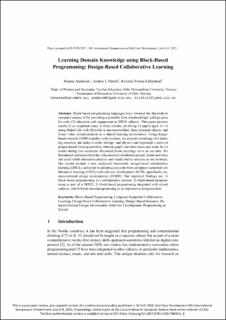Learning Domain Knowledge using Block-Based Programming: Design-Based Collaborative Learning
Peer reviewed, Journal article
Accepted version
Permanent lenke
https://hdl.handle.net/11250/2827167Utgivelsesdato
2021-06-24Metadata
Vis full innførselSamlinger
Originalversjon
Lecture Notes in Computer Science (LNCS). 2021, 119-136. https://doi.org/10.1007/978-3-030-79840-6_8Sammendrag
Block-based programming languages have lowered the threshold to computer science (CS), providing a powerful (low threshold-high ceiling) arena for early CS education and engagement in STEM subjects. This paper presents results of an empirical study in three schools, involving 43 pupils aged 12‒16 using MakeCode with Microbit (a microcontroller), basic physical objects, and Zoom video communication as a shared learning environment. Using designbased research (DBR) together with teachers, we created technology-rich learning materials and tasks in math, biology, and physics and organized a series of project-based learning activities wherein pupils met three hours per week for 16 weeks during two semesters. Recorded Zoom meetings serve as our data. We thematized and transcribed the video material of selected groups’ online activities and used verbal interaction analysis and visual artefact analysis as our methods. Our results include a new analytical framework, design-based collaborative learning (DBCL), achieved by adopting concepts from computer-supported collaborative learning (CSCL) and end-user development (EUD), specifically domain-oriented design environments (DODE). Our empirical findings are: 1) block-based programming in a collaborative context, 2) block-based programming as part of a DODE, 3) block-based programming integrated with school subjects, and 4) block-based programming as an explorative design method.
